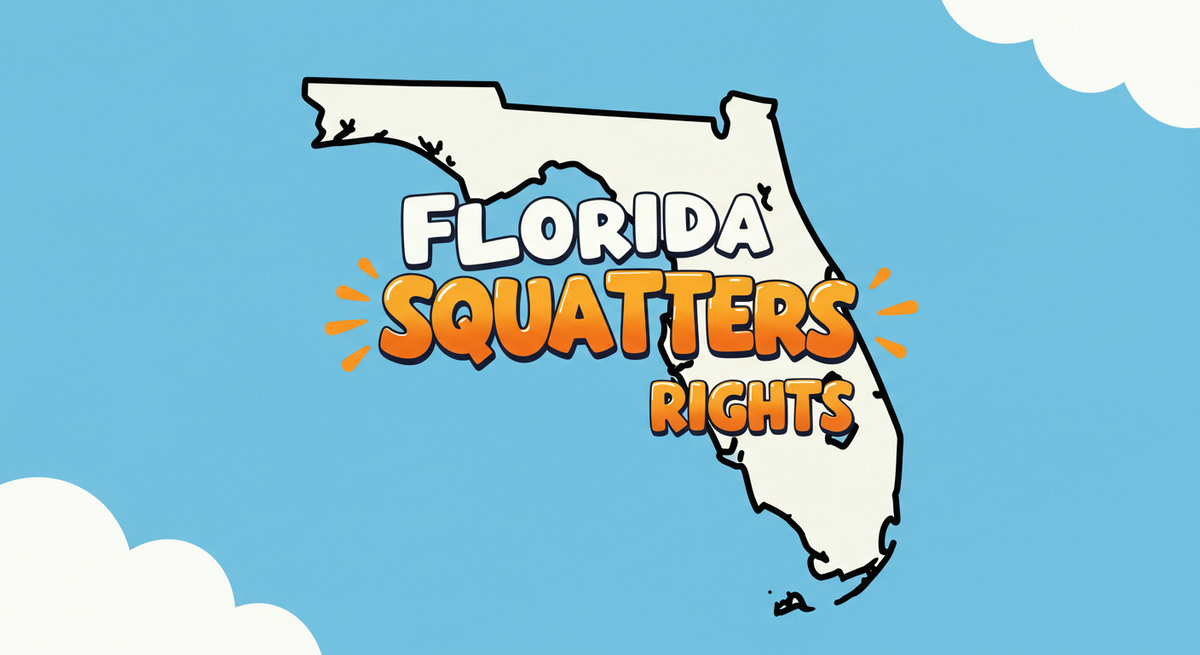Florida Squatter's Rights Guide: 2025 Laws, HB 621, and Property Protection
While Florida law states that an individual may attempt to gain title and ownership of a property through adverse possession after residing there long-term for seven years, this process is significantly impacted by House Bill 621, Senate Bill 322 and Senate Bill 606

A squatter is someone who occupies a property without the owner's permission and sometimes even claims legal ownership. In Florida, this issue has gained significant attention with the implementation of House Bill 621 in 2024, which substantially changed how unauthorized property occupation is handled in the state. The state has continued to strengthen these protections in 2025, making Florida one of the most aggressive states in the nation for protecting property owners' rights.
Florida law states that an individual may attempt to gain title and ownership of a property through adverse possession after residing there long-term for seven years, but this process is significantly impacted by House Bill 621 and subsequent 2025 legislation.
If a squatter's entry onto the property was unlawful, HB 621 allows property owners to request expedited removal by law enforcement, potentially preventing the squatter from meeting the continuous residence requirement.
Even if a squatter remains on the property for seven years, they must also meet strict requirements, including open and notorious possession, exclusive control, payment of property taxes, and, in many cases, having "color of title," before they can initiate a legal claim for adverse possession.
Key Takeaways
- Florida requires squatters to occupy property continuously for 7 years before they can file an adverse possession claim
- The new HB 621 law (effective July 1, 2024) allows property owners to request immediate removal of squatters by law enforcement
- New for 2025: Governor DeSantis signed additional legislation extending anti-squatter protections to commercial properties and hotels, effective July 1, 2025
- Squatters must pay property taxes and typically need a color of title to make a valid adverse possession claim
- Florida now imposes criminal penalties for squatting, ranging from misdemeanors to first-degree felonies
- Regular property inspections and security measures are the best prevention against squatters
- Florida's approach is now significantly more favorable to property owners than many other states
But First... A Squatter Snippet
Meth Island Community: In 2023, Florida officials discovered "Meth Island," where squatters built a four-story treehouse, welcome center, trampoline, and partial swimming pool on an uninhabited island near Port Orange. The settlement contained drug paraphernalia and booby traps, raising safety concerns. This case contributed to Florida passing House Bill 621 in 2024, which created one of America's strictest anti-squatter laws by allowing immediate removal through law enforcement rather than court proceedings.
Understanding Florida Squatter Rights in 2025
In Florida, squatting itself is not legal, though squatters have historically had certain rights through the doctrine of adverse possession. This legal principle allows individuals who occupy abandoned or neglected property without permission to potentially gain legal ownership after meeting specific conditions over a designated period.
It's important to understand the distinction between squatting and trespassing. Trespassing is a criminal offense that involves entering property without permission. Squatting typically involves a person living on a property for an extended period without authorization. The distinction becomes important in how law enforcement can respond to each situation.
With the implementation of HB 621 and the 2025 commercial property legislation, Florida has shifted from treating squatting as a purely civil matter to one with potential criminal implications, substantially strengthening property owners' rights across both residential and commercial properties.
Florida Adverse Possession Requirements
For a squatter to claim legal ownership through adverse possession in Florida, they must satisfy several stringent requirements known as the "OCEAN framework":
Open and Notorious The occupation must be visible and obvious to anyone, including the rightful owner. This prevents hidden or secretive occupation from qualifying for adverse possession. The squatter must live openly as if they were the rightful owner.
Continuous The squatter must occupy the property continuously for 7 years without interruption. Any temporary abandonment resets the clock on the adverse possession claim. This seven-year timeframe is longer than many other states require.
Exclusive The possession must be exclusive, meaning the squatter cannot share the property with others, including the rightful owner. The squatter must have sole control over the property.
Actual The squatter must physically occupy the property and treat it as their own. This includes maintaining the property, making improvements, or otherwise demonstrating actual possession. Simply claiming the property without physical occupation is insufficient.
Notorious (Hostile) In legal terms, "hostile" does not imply aggression but rather indicates that the occupation is without the owner's permission and against their rights. This can include situations where the squatter honestly believes they have a right to the property due to a misunderstanding or error.
Beyond these five fundamental requirements, Florida law imposes additional conditions:
- The squatter must pay all property taxes for the property during the 7-year period
- They must make improvements to, cultivate, or protect the property
- In many successful cases, they must have a "color of title" - a document that appears to give them ownership but contains a legal defect
Florida's Comprehensive Anti-Squatter Legislative Framework
Florida has implemented the most comprehensive anti-squatter protection system in the United States through a series of legislative measures signed by Governor Ron DeSantis.
House Bill 621 (2024): The Foundation
On March 27, 2024, Governor Ron DeSantis signed House Bill 621 into law, representing the most significant change to Florida's squatting laws in recent history. This legislation, which went into effect on July 1, 2024, fundamentally transformed how unauthorized property occupation is addressed in the state. The bill created Florida Statute Section 82.036, titled "Limited Alternative Remedy to Remove Unauthorized Persons from Residential Real Property."
2025 Expansion: Senate Bills 322 and 606
On June 2, 2025, Governor DeSantis signed two additional bills at a press conference in Sarasota, extending anti-squatter protections to commercial properties and hotels. Both Senate Bill 322 and Senate Bill 606 take effect on July 1, 2025, making Florida's approach even more comprehensive.
• Second-degree felony: Up to 15 years
• First-degree felony: Up to 30 years
• Second-degree felony: Up to $10,000
• First-degree felony: Up to $10,000
• Plus restitution for damages
Residential Property Protections (HB 621)
Key Provisions of HB 621:
Expedited Removal Process: Property owners can request immediate removal of squatters by local law enforcement under specific conditions:
- The individual has unlawfully entered and remains on the property
- The individual has been directed to leave but has refused
- The person is not a current or former tenant involved in a legitimate legal dispute
Required Documentation: Property owners must submit a completed and verified "Complaint to Remove Persons Unlawfully Occupying Residential Real Property" to the county sheriff. The complaint form is provided within the statute and must be submitted under penalty of perjury.
Criminal Penalties: The law establishes graduated penalties for squatting-related activities:
- Making false statements to obtain property: first-degree misdemeanor
- Causing property damage exceeding $1,000: second-degree felony
- Advertising unauthorized sale/rental of property: first-degree felony
Law Enforcement Role: Local sheriff's offices can now directly remove squatters after verifying the property owner's complaint. This eliminates the need for lengthy civil court proceedings in many cases.
Protection for Legitimate Tenants: The law explicitly excludes current or former tenants involved in legal disputes from the expedited removal process. This preserves tenant protections while addressing unauthorized occupation.
Commercial Property Protections (SB 322)
Senate Bill 322 creates a nonjudicial procedure for commercial property owners to request sheriff removal of unauthorized persons. The procedure mirrors the residential property process and covers restaurants, retail spaces, offices, warehouses, and other commercial properties.
Commercial Removal Process Commercial property owners can file a sworn complaint with the county sheriff's office to remove squatters within days instead of months. The sheriff must verify ownership and occupancy status before proceeding with removal.
Enhanced Authority for Law Enforcement The legislation expressly authorizes sheriffs to use reasonable force to enter properties and search them during the removal process. This provision applies to both residential and commercial properties.
Fee Structure Similar to residential properties, commercial property owners must pay the sheriff the civil eviction fee plus an hourly rate if a deputy must stand by during the unauthorized person's removal. Standard fees range from $90 in most Florida counties to $115 in Miami.
Hotel and Lodging Protections (SB 606)
Senate Bill 606 specifically targets the hospitality industry. It addresses issues with guests who refuse to pay or leave hotel and motel properties. Prior to this legislation, hotels were forced to go through lengthy landlord/tenant eviction processes.
Key Features:
- Clarifies definitions of transient and non-transient occupancy
- Allows written notice delivery by email, text message, or printed form
- Streamlines removal process for hotels and motels
- Beginning in 2026, requires restaurants to provide clear notice of automatic tips or service fees
This legislation represents a decisive response to increasing concerns about squatting incidents throughout Florida. While maintaining the legal concept of adverse possession, the law creates clear pathways for property owners to remove unauthorized occupants without enduring prolonged civil proceedings.
How Florida's Approach Differs From Other States
Florida's approach to squatter rights has evolved to become one of the most property-owner friendly in the nation, particularly after the passage of HB 621 and the 2025 commercial property legislation. The state has inspired other states to start passing similar measures, including Arkansas, the most recent state to update their squatters rights laws.
Here's how Florida compares to other states according to the Property Rights Strictness Index:
Adverse Possession Timeframes
| State | Required Occupation Period | Tax Payment Required |
|---|---|---|
| Florida | 7 years | Yes |
| California | 5 years | Yes |
| New York | 10 years | No |
| Texas | 10 years (3 with deed) | Yes |
| Georgia | 20 years (7 with deed) | Yes |
| Alabama | 10 years (color of title) | Yes |
Enforcement Approaches Unlike most states that still treat squatting primarily as a civil matter requiring court proceedings, Florida's comprehensive legislation creates a direct pathway for law enforcement involvement across residential, commercial, and hospitality properties. This represents a significant shift toward treating unauthorized occupation as a potential criminal matter rather than solely a property dispute.
States like California and New York still typically require property owners to go through lengthy eviction processes even for clear cases of squatting. In contrast, Florida now enables sheriffs to verify ownership claims and remove unauthorized occupants directly in many cases across all property types.
Criminal vs. Civil Treatment Florida has taken the bold step of establishing clear criminal penalties for squatting activities. Charges range from misdemeanors to felonies depending on the circumstances. Most other states still primarily address squatting through civil remedies. Criminal charges are typically limited to associated activities like breaking and entering or property damage.
Legislative Trends Following Florida's lead, several states including Texas, Georgia, and Tennessee are considering similar legislation. They want to streamline the removal of unauthorized occupants and establish stronger criminal penalties. Florida appears to be at the forefront of a national trend toward strengthening property owners' rights against squatters.
The differences highlight Florida's commitment to protecting property rights through a multi-faceted approach. It combines traditional adverse possession doctrine with enhanced enforcement mechanisms and criminal deterrents across all property types.
How to Prevent Squatters in Florida Properties
Prevention remains the most effective strategy for property owners. Here are key preventive measures to protect your property from squatters:
Regular Property Inspections
- Visit vacant properties regularly or hire a property management company to conduct routine inspections
- Document the condition of the property with dated photographs
- Maintain landscaping and exterior appearance to show active ownership
Security Systems and Monitoring
- Install visible security cameras and alarm systems
- Consider smart home security that provides remote monitoring capabilities
- Use motion-activated lighting around the property perimeter
- Install sturdy locks, security doors, and window reinforcements
Property Maintenance
- Keep utilities active but on minimum service levels for vacant properties
- Maintain landscaping and exterior appearance
- Collect mail regularly or have it forwarded
- Schedule timed interior lighting to create the appearance of occupation
Documentation and Signage
- Post "No Trespassing" signs prominently on the property
- Maintain comprehensive documentation of ownership
- Consider filing a "Declaration of Use" with your county property appraiser
- Maintain records of all property taxes paid and improvements made
Community Involvement
- Inform neighbors about vacant properties and ask them to report suspicious activity
- Join neighborhood watch programs
- Consider hiring a house-sitting service for extended absences
Professional Management
- Retain a property management company for vacant properties
- Consider short-term rentals if appropriate for your property
- Ensure quick tenant placement to minimize vacancy periods
These preventive measures not only deter potential squatters but also help establish a clear record of active ownership. This can prove invaluable if adverse possession claims arise.
Legal Process for Removing Squatters in Florida
If prevention fails and you discover squatters occupying your property, Florida's comprehensive legislation provides streamlined processes for removal across different property types:
Under the Enhanced Anti-Squatter Process (HB 621 & 2025 Legislation):
Step 1: Document Ownership Gather proof of property ownership such as deed, property tax records, mortgage statements, or other official documentation.
Step 2: File a Verified Complaint Submit a detailed complaint to the local sheriff's office, including:
- Proof of ownership
- Description of the unauthorized occupants
- Statement that the occupants entered unlawfully
- Confirmation that the occupants have been asked to leave but refused
- Verification that the occupants are not current or former tenants in a legal dispute
Step 3: Law Enforcement Verification The sheriff's office will verify your ownership claim and determine if the situation qualifies for immediate removal under the applicable legislation.
Step 4: Removal Notice If verified, law enforcement will serve notice to the unauthorized occupants requiring them to vacate, typically with a 24-hour timeframe.
Step 5: Physical Removal If the squatters fail to vacate, law enforcement can physically remove them from the property. Sheriffs are authorized to use reasonable force and enter properties during the removal process.
Step 6: Secure the Property Once squatters are removed, immediately secure the property to prevent reoccupation.
Fee Structure
Property owners must pay the sheriff the civil eviction fee plus an hourly rate if a deputy must stand by during removal. Standard removal fees range from $90 in most Florida counties to $115 in Miami.
Traditional Eviction Process (if Enhanced Process doesn't apply):
If the situation doesn't qualify for the expedited process (for example, if the occupants were previously authorized tenants), you may need to pursue a traditional eviction:
- Serve an Eviction Notice: Provide a written notice to vacate in accordance with Florida landlord-tenant law.
- File an Unlawful Detainer Lawsuit: If they don't leave, file a lawsuit with the county court.
- Attend Court Proceedings: Present your case to the judge.
- Obtain a Writ of Possession: If successful, the court will issue this document.
- Sheriff's Execution: The sheriff will post the writ and return to remove the occupants if they don't leave voluntarily.
The comprehensive 2024-2025 legislation significantly reduces the time and cost associated with removing unauthorized occupants in qualifying cases. This provides substantial benefits to Florida property owners across residential, commercial, and hospitality sectors..
Fee Structure
Property owners must pay the sheriff the civil eviction fee plus an hourly rate if a deputy must stand by during removal. Standard removal fees range from $90 in most Florida counties to $115 in Miami.
Traditional Eviction Process (if Enhanced Process doesn't apply):
If the situation doesn't qualify for the expedited process (for example, if the occupants were previously authorized tenants), you may need to pursue a traditional eviction:
- Serve an Eviction Notice: Provide a written notice to vacate in accordance with Florida landlord-tenant law.
- File an Unlawful Detainer Lawsuit: If they don't leave, file a lawsuit with the county court.
- Attend Court Proceedings: Present your case to the judge.
- Obtain a Writ of Possession: If successful, the court will issue this document.
- Sheriff's Execution: The sheriff will post the writ and return to remove the occupants if they don't leave voluntarily.
The comprehensive 2024-2025 legislation significantly reduces the time and cost associated with removing unauthorized occupants in qualifying cases, providing substantial benefits to Florida property owners across residential, commercial, and hospitality sectors.
Landlord Rights and Responsibilities
As a property owner in Florida, you have specific rights and responsibilities regarding squatters:
Rights:
- Request immediate removal of unauthorized occupants under the enhanced anti-squatter legislation
- Pursue traditional eviction procedures if expedited removal isn't applicable
- Seek damages for property destruction or unauthorized modifications
- File trespassing charges in appropriate circumstances
- Maintain and protect your property from unauthorized entry
Responsibilities:
- Follow legal procedures for removal rather than attempting "self-help" evictions
- Distinguish between squatters and legitimate tenants with legal disputes
- Properly document ownership and unauthorized occupation
- Pay appropriate fees for sheriff's services when utilizing expedited removal procedures
- Secure property after removal to prevent reoccupation
Understanding these rights and responsibilities helps ensure that you address squatter situations legally and effectively while avoiding potential liability for improper removal procedures.
Tenant vs. Squatter: Legal Distinctions
It's crucial to understand the legal difference between a tenant and a squatter, as the removal processes differ significantly:
Tenants:
- Have lawful permission to occupy the property through a formal or informal agreement
- Pay rent (though may be behind on payments)
- Have established rights under Florida landlord-tenant laws
- Must be removed through formal eviction proceedings, not the enhanced anti-squatter process
- Include former tenants whose leases have expired but continue to occupy the property
Squatters:
- Never had lawful permission to occupy the property
- Entered the property without authorization
- Pay no rent and have no rental agreement
- Can potentially be removed through the expedited anti-squatter process
- Have no legitimate claim to tenancy rights
Key Distinctions in Documentation:
- Tenants have lease agreements, rent receipts, or evidence of payment
- Squatters typically cannot produce legitimate documentation of occupancy rights
- Property owners should maintain records that clearly establish who is authorized to occupy their properties
Properly identifying whether an occupant is a tenant or squatter is essential for determining the appropriate legal process for removal and avoiding potential legal complications.
Legal Safeguards and Wrongful Removal Protections
Florida's anti-squatter legislation includes important protections against abuse of the system:
Remedies for Wrongful Removal Both residential and commercial anti-squatter laws include provisions for individuals wrongfully removed from properties. Those successfully proving wrongful removal can recover three times the fair market rent, damages, costs, and attorney fees.
Verification Requirements Sheriffs must verify property ownership before proceeding with removal, providing a safeguard against abuse of the system. The complaint forms require detailed information under penalty of perjury.
Perjury Protections Property owners must submit complaints under penalty of perjury, creating legal consequences for false statements and helping prevent abuse of the expedited removal process.
Legal Help for Florida Property Owners
Navigating squatter situations may require professional legal assistance. Here are resources for Florida property owners:
Types of Legal Professionals:
- Real Estate Attorneys: Specialize in property law and can guide you through removal processes
- Property Management Companies: Often have legal departments experienced in handling unauthorized occupants
- Eviction Services: Specialized companies that manage the eviction process for a fee
Cost Expectations:
- Legal consultation: $200-500 per hour
- Unlawful detainer filing: $300-500 plus court costs
- Complete eviction services: $1,000-2,500 depending on complexity
- Sheriff's fees for enhanced anti-squatter enforcement: $90-115 plus hourly rates
Timeline Considerations:
- Enhanced anti-squatter process: Potentially as quick as 24-48 hours after verification
- Traditional eviction: 3-6 weeks depending on court scheduling and tenant response
- Adverse possession defense: Several months if litigation is required
Resources and Referrals:
- Florida Bar Association Referral Service: 800-342-8011
- County Property Appraiser's Office
- Local Sheriff's Office
- Florida Department of Revenue (for adverse possession filings)
Consulting with a qualified attorney early in the process can help prevent costly mistakes and ensure you follow the proper legal procedures for your specific situation.
Case Studies: Florida Squatter Situations Resolved
Case 1: Vacation Home in Naples Situation: John and Mary owned a vacation home in Naples that they visited twice yearly. During a six-month absence, they discovered someone had moved in, changed the locks, and claimed to have a lease (which was fraudulent).
Resolution: Using the new HB 621 process, they filed a verified complaint with the Collier County Sheriff's Office, providing their deed and tax records as proof of ownership. After verification, the sheriff served notice to the squatters, who vacated within 24 hours rather than face criminal charges.
Lesson: Regular property checks might have prevented the occupation, but the new law enabled quick resolution without court proceedings.
Case 2: Inherited Property in Orlando Situation: Sarah inherited a property from her grandfather but delayed visiting for eight months while handling estate matters. When she finally visited, she found a family living there who claimed they had been there for over a year and were working toward adverse possession.
Resolution: Sarah hired an attorney who determined the occupation had been less than the required seven years. They discovered the occupants had not paid property taxes or filed the required adverse possession paperwork with the Department of Revenue. Using documentation from the probate court and tax records, they followed the HB 621 process, resulting in the squatters' removal by the Orange County Sheriff's Office.
Lesson: Prompt attention to inherited properties and documentation of ownership transitions are essential to prevent squatter claims.
Case 3: Investment Property in Jacksonville Situation: A property investment company purchased a foreclosed home and planned renovations. Before work began, squatters occupied the property and refused to leave, causing significant damage.
Resolution: The company documented the recent purchase with closing documents and property records. They filed a criminal complaint based on the property damage (exceeding $1,000), triggering both the HB 621 removal process and criminal charges against the squatters. The squatters were removed and subsequently faced second-degree felony charges under the new law.
Lesson: Immediate action and documentation of property damage strengthened the case and resulted in both removal and potential criminal consequences for the squatters.
Case 4: Commercial Restaurant Space (2025) Situation: A restaurant owner in Miami discovered that unauthorized individuals had taken over a vacant commercial space adjacent to their business and were operating an illegal food cart operation from the property.
Resolution: Using the new Senate Bill 322 process, the restaurant owner filed a complaint with the Miami-Dade Sheriff's Office. After verifying ownership of the commercial property, law enforcement served notice and removed the unauthorized occupants within 48 hours. The expedited process prevented what could have been months of legal proceedings.
Lesson: The 2025 commercial property protections provide the same efficient remedies for business owners as residential property owners enjoy.
These cases illustrate how Florida's comprehensive anti-squatter approach has provided property owners with more efficient remedies while still maintaining legal processes that protect legitimate tenants.
Frequently Asked Questions
General Squatter Rights Questions
Q: What are squatter's rights in Florida? A: Squatter's rights refer to adverse possession laws that potentially allow someone to claim ownership of property after occupying it openly, continuously, and without permission for seven years while meeting specific legal requirements.
Q: Is squatting illegal in Florida? A: Yes, unauthorized occupation of property is illegal in Florida. The comprehensive anti-squatter legislation establishes clear criminal penalties for squatting activities, ranging from misdemeanors to felonies depending on the circumstances.
Q: How long does someone have to squat on property in Florida to claim ownership? A: In Florida, a squatter must continuously occupy a property for seven years before they can file an adverse possession claim. They must also meet several other requirements, including paying property taxes.
Q: Do squatters have to pay property taxes in Florida? A: Yes. To make a valid adverse possession claim in Florida, squatters must pay all property taxes during their occupation period and file a return with the county property appraiser.
Prevention and Removal
Q: How can I prevent squatters from occupying my property? A: Regular property inspections, security systems, property maintenance, "No Trespassing" signs, and professional property management are effective prevention strategies.
Q: How do I remove squatters from my property in Florida? A: Under the comprehensive anti-squatter legislation, property owners can file a verified complaint with the local sheriff's office for immediate removal if the occupants entered unlawfully and have refused to leave. This applies to residential, commercial, and hospitality properties.
Q: Can I physically remove squatters myself? A: No. Self-help evictions are illegal in Florida. Property owners must use legal processes, either through the enhanced anti-squatter procedures or formal eviction procedures, to remove unauthorized occupants.
Q: Can I turn off utilities to force squatters to leave? A: No. Turning off utilities is considered a self-help eviction tactic and is illegal in Florida. This could potentially expose you to legal liability.
Legal Implications
Q: What are the new laws in Florida about squatters? A: Florida has implemented comprehensive anti-squatter legislation including HB 621 (2024) for residential properties and SB 322 and SB 606 (2025) for commercial properties and hotels. These laws allow for expedited removal by law enforcement and establish criminal penalties for unauthorized occupation.
Q: How does Florida's approach to squatters differ from other states? A: Florida's 7-year requirement is longer than some states (like California's 5 years) but shorter than others (like Georgia's 20 years). Florida's comprehensive legislation is more property-owner friendly than most states by establishing criminal penalties and expedited removal processes across all property types.
Q: What's the difference between a squatter and a trespasser? A: Trespassing is a temporary unauthorized entry, while squatting involves sustained occupation of a property. Trespassing is immediately addressed as a criminal matter, while squatting has historically been treated as a civil issue (though this is changing under Florida's new legislation).
Q: Can squatters be charged with a crime in Florida? A: Yes. Under the comprehensive anti-squatter legislation, squatters can face criminal charges ranging from misdemeanors to felonies depending on their actions, including making false statements, causing property damage, or fraudulently advertising property for rent or sale.
Special Situations
Q: What if the squatter was previously a tenant? A: If the occupant was previously a legitimate tenant, they must be removed through traditional eviction procedures rather than the expedited anti-squatter process.
Q: What if I'm buying a property with squatters already living there? A: The purchase should be contingent on the removal of unauthorized occupants. The current owner should complete the removal process before closing, or you should consult with an attorney about assuming this responsibility.
Q: What if squatters damage my property? A: Document all damage with photographs and detailed descriptions. Under the anti-squatter legislation, causing property damage exceeding $1,000 can result in second-degree felony charges. You may also pursue civil remedies for financial compensation.
Q: What properties are most likely to attract squatters? A: Vacant, abandoned, or foreclosed properties are most vulnerable, particularly those that appear unmonitored or neglected. Vacation homes, investment properties, and commercial spaces that sit empty for extended periods are also at higher risk.
Q: Do the new laws apply to commercial properties? A: Yes. The 2025 legislation (SB 322 and SB 606) extends anti-squatter protections to commercial properties, restaurants, retail spaces, offices, warehouses, hotels, and motels.
Conclusion
Florida's approach to squatter's rights has evolved significantly, with the comprehensive anti-squatter legislation representing a transformation that strengthens property owners' rights while maintaining the historical legal doctrine of adverse possession under strictly defined circumstances.
The seven-year timeframe for adverse possession claims remains in place, but the new criminal penalties and expedited removal processes make successful adverse possession significantly more challenging to achieve. Property owners now have greater certainty and more efficient remedies against unauthorized occupation across residential, commercial, and hospitality properties.
Florida's comprehensive approach, spanning from HB 621 in 2024 to the 2025 commercial and hotel protections, represents one of the most aggressive anti-squatter frameworks in the United States. This legislation has positioned Florida as a leader in property rights protection and has inspired similar legislative efforts in other states.
For property owners, the keys to protecting your investment include:
- Regular monitoring and maintenance of properties
- Prompt action if unauthorized occupants are discovered
- Following legal procedures rather than self-help eviction measures
- Maintaining comprehensive documentation of ownership and property conditions
- Considering professional property management for vacant properties
- Understanding which anti-squatter process applies to your property type
By understanding Florida's comprehensive squatter rights laws and taking preventive measures, property owners can significantly reduce their risk of unauthorized occupation and potential adverse possession claims across all types of properties.
Resources and References
- Florida Statutes § 95.18: Adverse Possession
- House Bill 621 (2024): Property Rights
- Senate Bill 322 (2025): Commercial Property Protections
- Senate Bill 606 (2025): Hotel and Lodging Protections
- Florida Statute Section 82.036: Limited Alternative Remedy to Remove Unauthorized Persons from Residential Real Property
- Florida Department of Revenue: Adverse Possession Guidelines
- Florida Bar Association: Property Rights Resources
- County Property Appraiser's Offices: Adverse Possession Filings
- Local Sheriff's Offices: Anti-Squatter Enforcement Procedures
Disclaimer: This article provides general information and does not constitute legal advice. Consult with a qualified attorney for guidance on your specific situation.





